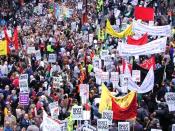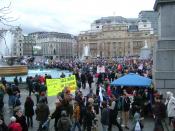When looking at this title we have to understand that there is more than one conception of power, in the World today. In fact, people may have very differing views on what they conceive to be power. In essence there are three basic arguments, which have been put forward in the past hundred years when trying too define political power. The first view is that of Dahl (1961 and 1968), where power is seen in decision-making and those that help cement the final decisions are seen as the holders of power. Bachrach and Baratz (1962), though, take this theory a stage further and in essence come up with an idea that power is not just about the decisions that are made but the planning / agenda setting behind these decisions i.e. what questions regarding the decisions are omitted and what proposals aren't even considered. This though still leaves power in the hands of the few whether it is legitimate or not.
Lukes considers a different view that power isn't just held by decision makers / agenda setters but that those who are able to manipulate others i.e. through the popular press and other forms of propaganda hold power.
To help me with this question I will use the example of 'Stop the War Coalition'. The 'Stop the War Coalition' is an outsider pressure group, which has come to the fore in recent months, with millions of protesters Worldwide having lined the streets trying to convince world powers not to go to war in Iraq. This isn't the first political action group that has used protests and leaflets etc. to try and pressure World governments into changing policies / decisions (ban the bomb etc.). The question is, is this an example of power or do these kind...


